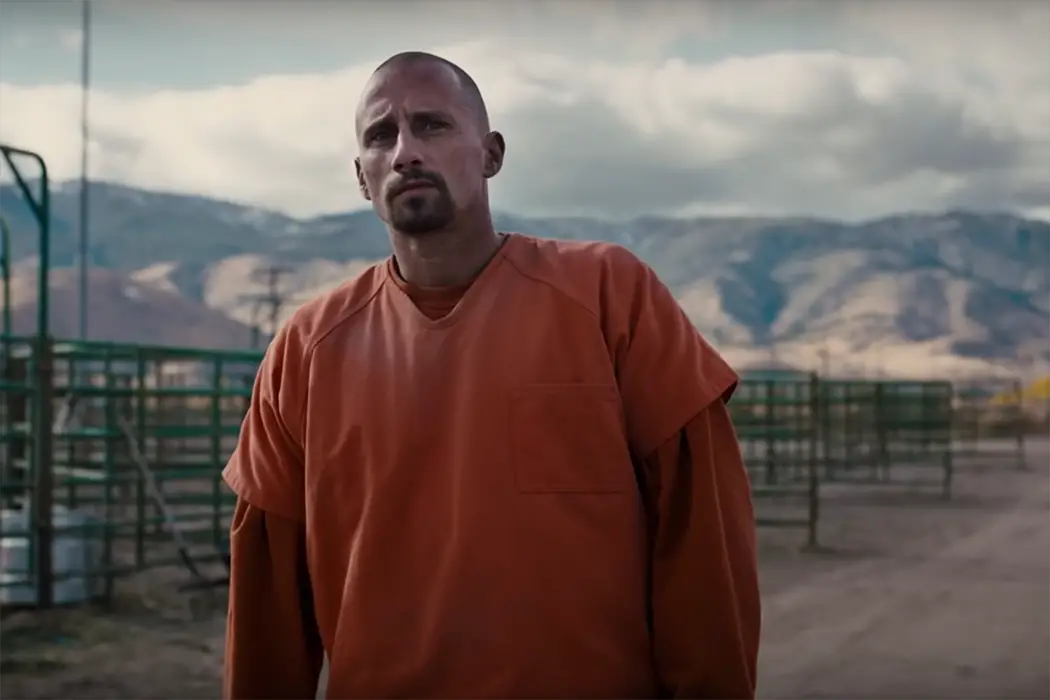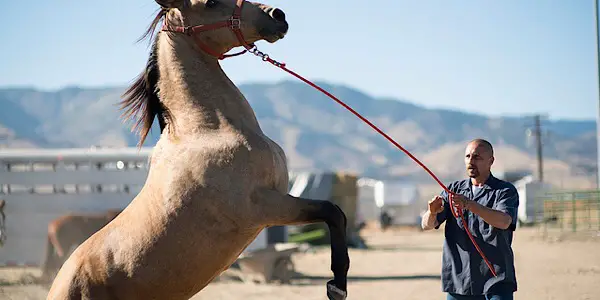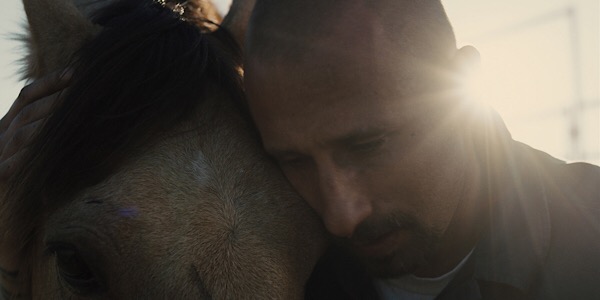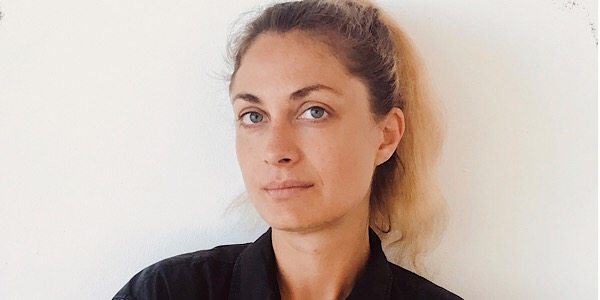Sundance Film Festival 2019 – Interview With Co-writer/Director Of THE MUSTANG, Laure De Clermont-Tonnerre

Kristy Strouse is the Owner/Editor in Chief of Film Inquiry,…
The Mustang, a beautiful sentiment to both horses and human perseverance, had its premiere at Sundance Film Festival this year. The film is about a prison program that has inmates training wild mustangs to be later auctioned off (usually for police use). It is a worthwhile viewing experience, and I was lucky enough to speak with the co-writer and director, Laure de Clermont-Tonnerre, about her preparation for the film, working with animals, and the outlook for women in film.
Kristy Strouse for Film Inquiry: Sounds like you have been busy!
Laure de Clermont-Tonnerre: Yes! I have been very busy, and I am very excited!
Of course, and congratulations! I really loved the film, very moving!
Laure de Clermont-Tonnerre: Thank you so much. Did you know about these programs prior?
I didn’t! I actually had no idea about that, so it was even more fascinating.
Laure de Clermont-Tonnerre: It is crazy that this is something in America, but people don’t even know about it.
Definitely! And it makes for an interesting plot. Did you do a lot of research on these programs like this for the story?

Laure de Clermont-Tonnerre: Yes absolutely. I did four years of research in multiple prisons, mainly in the Northern Nevada correctional Center. This program was born there years ago and I also met a therapist who worked in prisons in California. I also went to San Quentin multiple times to meet with men with strong anger issues and violence issues, to understand my character better and to make sure I portrayed an arc and a tragic story that was relevant. So, my character is inspired by different men who are in those sort of prisons, so yeah, a lot of research. I needed to immerse myself in this world and understand what I was talking about.
Yes, I love that. I also noticed that there are a lot of parallels with Roman and the horse. I know you mentioned the anger issues – they are both a bit wild.
Laure de Clermont-Tonnerre: They are both wild, both are in prison, in their environment. The only difference between a domestic horse and a wild horse is that a horse born in the wild has to really sustain, and live, and go through a lot of obstacles to live. Roman has these strong anger issues that make him aggressive and he ends up in prison, and it’s kind of like they mirror each others journey, through eventual redemption. The horse teaches the man to reconnect with his own emotions so he is capable of love and empathy. I feel like with a horse there is a lack of judgment, there are no words, just body language and invisible dialogue.
There is something very deep and emotional for the man to find out who he is, through an animal. There are different steps of training between those men and those horses and it was fascinating how it takes a lot of time just for the man to be able to even touch the horse. That is actually where I wanted to focus the story, all the dancing, until the man and horse finally learn patience and resurrect from their past.
That really came through, there is a lot of necessary patience to it, which obviously Roman doesn’t have for awhile. It is very interesting, and I love the shots of the horses in the wild – beautiful. Was it difficult to work with them at all?
Laure de Clermont-Tonnerre: Yes, it was definitely challenging working with them. I love horses and I grew up riding horses and it was pretty challenging. We had a wonderful horse trainer who was kind of the key to the successful shoot because he requested a lot of discipline that we all had to follow, a lot of quietness and a lot of precision. So there was a choreography between the trainer, the horse and Matthias and the camera that had to be so precise and so well choreographed for the sake of everyone, we needed to have this discipline. It was actually very successful because I ended up having much more trouble with men than horses. [Laughs] That’s a joke, I loved working with the horses, it brought a lot of peace to the set.
I can see that! Speaking of Matthias, he is incredible, he conveys a lot with very little words. Did you have him in mind at all when you were first started the casting process?
Laure de Clermont-Tonnerre: Yes I met Matthias through my French agent. We have the same agent and I knew his work and I was aware of his work and I knew that he was personally close to this character. When I met him he was driven by something so personal, so deep. I was moved by his involvement to portray Roman, and I was very lucky because I think all of the cast responded to the story and those characters in a very personal way. Everybody was driven with the passion to connect to themselves or to their life. Matthias was the first one to come on board, and has the pure will to do the research with me, and to absorb and to understand. It felt very therapeutic for both of us to take this journey together, it was amazing.
What inspires you when it comes to writing and directing, what do you draw form, is there anything in particular?
Laure de Clermont-Tonnerre: I did three short films before The Mustang and unconsciously the common link between all those works were prison. You never write a subject by coincidence, there’s something about yourself to explore. I think I grew up to the subject, exploring prison. I am not a man, I’m not American, I’m not violent and I’m not in prison, but I definitely can relate to a sense of imprisonment and I needed to explore. I had an obsession. My second feature is also about that, more like a psychological female imprisonment. Maybe after that I’ll be done with imprisonment, [laughs] I hope.
Is that something you are working on now?
Laure de Clermont-Tonnerre: Yes, after Sundance, I’m going to start working on that film.

We look forward to that! What has your experience at Sundance been like so far?
Laure de Clermont-Tonnerre: I had a short film premiere at Sundance four years ago and I also had the luck to do a screenwriting lab and the directing lab and multiple other labs. Then I worked on The Mustang, so to be back here with the film and be re-immersed into Sundance after all these years is very important to me, very powerful, it’s where everything started.
Absolutely. There are so many talented female directors at Sundance this year and I loved The Mustang. It’s one of my favorites so far that I’ve seen, and it’s very exciting that there is more inclusion. Do you see the landscape changing, with more opportunities for women?
Laure de Clermont-Tonnerre: Thank you! Absolutely. I think it’s such an exciting moment to be a female filmmaker because I have seen in the last couple of years so much change. There are so many stories told by women and from a woman’s perspective. Being at the festival four years ago and then being there today I see such a huge difference.
Actually, Sundance introduced a new model into the festival landscape of the world. I had been to Cannes, Venice, and Berlin Film Festival and they are far behind as far as introducing female filmmakers, so I really hope that Sundance impacts the other festivals and people will open up more opportunities for women. It’s a really good part. The United States is leading the field right now and I hope Europe is going to think about it.
I hope so too!
Laure de Clermont-Tonnerre: There was only one female director at the Venice film festival last Summer and Cannes film festival even though they have made a lot of progress there is still a lot to do. So, I think Sundance sets such a great example.

Hopefully it does make a difference with other festivals in the future. Thank you for your time again, and congratulations, we look forward to your next feature!
Laure de Clermont-Tonnerre: Thanks and thank you so much for your time!
We want to thank Laure de Clermont-Tonnerre for taking the time to share her thoughts during Sundance.
The Mustang is coming to theaters in March 2019.
Does content like this matter to you?
Become a Member and support film journalism. Unlock access to all of Film Inquiry`s great articles. Join a community of like-minded readers who are passionate about cinema - get access to our private members Network, give back to independent filmmakers, and more.
Kristy Strouse is the Owner/Editor in Chief of Film Inquiry, writer, podcaster, and all around film and TV fanatic. She's also VP of Genomic Operations at Katch Data and is a member of The Online Association of Female Film Critics and The Hollywood Creative Alliance. She also has a horror website: Wonderfully Weird & Horrifying.













